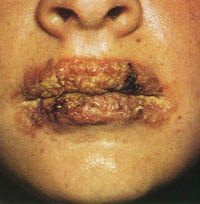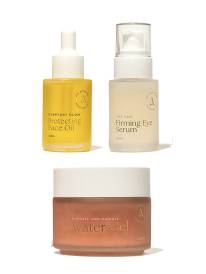Eczema Research

Groundbreaking research highlights eczema burden among Australian adults
More than a million adult Australians suffering from a common, life-long, inflammatory skin disease, are at risk of physical, psychological and financial pressures. This burden also extends to their carers and the community at large, according to new research released today to coincide with Eczema Awareness Week (22-28 September).
The Atopic Eczema Health Survey - the only study of its kind among Australian adults and conducted by researchers from the Department of Dermatology at St. Vincent's Hospital, Melbourne - monitored the severity of disease, impact on quality of life and financial costs of treatment for 85 Victorians with atopic eczema (AE) over a one year period.
According to lead study investigator and dermatologist, Professor Robin Marks from St. Vincent's Hospital: "The survey was designed to get a clear picture of the affect of atopic eczema on individuals over time. What we now know is that atopic eczema has the potential to cause considerable distress, as well as be a financial burden for those with the condition and those caring for them."
Spending up to $2,000 managing eczema
Professor Marks said the study also shows the potential monetary costs associated with treating eczema: "Forty per cent of the study participants were using four or more products to treat their eczema. The average out-of-pocket amount spent on products per year among the study participants was $425, with costs ranging from $13.50 to more than $2,000 per individual (for those with more severe disease). On average, the participants spent $121 per annum on medical consultations, with consultation costs ranging from zero to more than $800 per individual."
National President of the Eczema Association of Australia, Ms Heather Jacobs said this research reinforces what has long been suspected: "This common, frustrating and often debilitating skin disease can have a significant physical and emotional toll on sufferers and their carers' quality of life, while also proving costly to the public purse."
Eczema sufferers consider stress to be the main reason for their flare-ups. "Of the 66 responses from participants who said that a life event had made their atopic eczema worse, 64 per cent cited increased stress as a reason," said Professor Marks. "The weather, hormones, treatments, holidays and illness were other reasons voiced by participants for the deterioration of their skin disease."
Negative impact on quality of life
Eczema also has a negative impact on the daily lives of sufferers, and those with more severe disease experience further problems. For example, 45 per cent said their skin felt itchy, sore, painful and stinging, while 36 per cent spent more than 10 minutes applying daily treatments. Another 28 per cent said that their eczema influenced the clothes they wore, while 21 per cent said their skin disease was a source of embarrassment or made them feel self-conscious.
More than half of the participants considered Spring to be the worst season for their eczema due to the time spent (often more than 20 minutes) applying daily treatments.
Among the study participants, two in three had both a personal and family history of an atopic disorder - asthma and hayfever. Almost half were suffering from moderate eczema, while one in four had a severe form of the skin disease. At an average age of 36, the study participants were recruited from urban and rural Victorian sites between January 1999 to February 2000 and monitored for one year by the research team.
Parliamentary Secretary to the Prime Minister, the Hon. Jackie Kelly MP, fully understands the adverse impact that eczema can have upon the quality of life of individual sufferers and their carers. With both a personal and family history of eczema, she has today accepted an invitation to become Patron of the Eczema Association of Australia.
"I urge anyone either directly or indirectly affected by eczema to join me in helping the Eczema Association of Australia continue to provide quality education and support to those in need," Ms Kelly said.
About eczema
Eczema is a common, recurring, non-infectious, inflammatory skin disease in which the skin becomes red, dry, itchy or scaly and may even weep, bleed or crust over. The disease varies in frequency and severity among different age groups, but often appears in childhood and disappears around six years of age. More than half of all eczema sufferers show signs of the disease within the first 12 months of life and 90 per cent of people develop eczema before the age of five.
Studies suggest that a family history plays a role in eczema, although its increasing prevalence may be triggered by exposure to environmental irritants and allergens including carpets and housing, diet, soaps, detergents and pollution. While there is no known cure for eczema, treatment can offer symptom control.
People seeking further information about how to better manage and treat eczema should consult their medical practitioner or call the Eczema Association of Australia on 1300 300 182 or visit www.eczema.org.au.
CLICK HERE TO READ MORE FACTS ON ECZEMA
More than a million adult Australians suffering from a common, life-long, inflammatory skin disease, are at risk of physical, psychological and financial pressures. This burden also extends to their carers and the community at large, according to new research released today to coincide with Eczema Awareness Week (22-28 September).
The Atopic Eczema Health Survey - the only study of its kind among Australian adults and conducted by researchers from the Department of Dermatology at St. Vincent's Hospital, Melbourne - monitored the severity of disease, impact on quality of life and financial costs of treatment for 85 Victorians with atopic eczema (AE) over a one year period.
According to lead study investigator and dermatologist, Professor Robin Marks from St. Vincent's Hospital: "The survey was designed to get a clear picture of the affect of atopic eczema on individuals over time. What we now know is that atopic eczema has the potential to cause considerable distress, as well as be a financial burden for those with the condition and those caring for them."
Spending up to $2,000 managing eczema
Professor Marks said the study also shows the potential monetary costs associated with treating eczema: "Forty per cent of the study participants were using four or more products to treat their eczema. The average out-of-pocket amount spent on products per year among the study participants was $425, with costs ranging from $13.50 to more than $2,000 per individual (for those with more severe disease). On average, the participants spent $121 per annum on medical consultations, with consultation costs ranging from zero to more than $800 per individual."
National President of the Eczema Association of Australia, Ms Heather Jacobs said this research reinforces what has long been suspected: "This common, frustrating and often debilitating skin disease can have a significant physical and emotional toll on sufferers and their carers' quality of life, while also proving costly to the public purse."
Eczema sufferers consider stress to be the main reason for their flare-ups. "Of the 66 responses from participants who said that a life event had made their atopic eczema worse, 64 per cent cited increased stress as a reason," said Professor Marks. "The weather, hormones, treatments, holidays and illness were other reasons voiced by participants for the deterioration of their skin disease."
Negative impact on quality of life
Eczema also has a negative impact on the daily lives of sufferers, and those with more severe disease experience further problems. For example, 45 per cent said their skin felt itchy, sore, painful and stinging, while 36 per cent spent more than 10 minutes applying daily treatments. Another 28 per cent said that their eczema influenced the clothes they wore, while 21 per cent said their skin disease was a source of embarrassment or made them feel self-conscious.
More than half of the participants considered Spring to be the worst season for their eczema due to the time spent (often more than 20 minutes) applying daily treatments.
Among the study participants, two in three had both a personal and family history of an atopic disorder - asthma and hayfever. Almost half were suffering from moderate eczema, while one in four had a severe form of the skin disease. At an average age of 36, the study participants were recruited from urban and rural Victorian sites between January 1999 to February 2000 and monitored for one year by the research team.
Parliamentary Secretary to the Prime Minister, the Hon. Jackie Kelly MP, fully understands the adverse impact that eczema can have upon the quality of life of individual sufferers and their carers. With both a personal and family history of eczema, she has today accepted an invitation to become Patron of the Eczema Association of Australia.
"I urge anyone either directly or indirectly affected by eczema to join me in helping the Eczema Association of Australia continue to provide quality education and support to those in need," Ms Kelly said.
About eczema
Eczema is a common, recurring, non-infectious, inflammatory skin disease in which the skin becomes red, dry, itchy or scaly and may even weep, bleed or crust over. The disease varies in frequency and severity among different age groups, but often appears in childhood and disappears around six years of age. More than half of all eczema sufferers show signs of the disease within the first 12 months of life and 90 per cent of people develop eczema before the age of five.
Studies suggest that a family history plays a role in eczema, although its increasing prevalence may be triggered by exposure to environmental irritants and allergens including carpets and housing, diet, soaps, detergents and pollution. While there is no known cure for eczema, treatment can offer symptom control.
People seeking further information about how to better manage and treat eczema should consult their medical practitioner or call the Eczema Association of Australia on 1300 300 182 or visit www.eczema.org.au.
CLICK HERE TO READ MORE FACTS ON ECZEMA
MORE
- How to Conquer Bad Winter Health Habits
- Resident Evil: What Lies Outside'
- 1.5 million for 1.5 million Victorians...
- Be U Not a Bully Forum for Parents and Teens
- New Screening Test Recommended To Help Prevent...
- Vitamin D Mushrooms May Solve Health Dilemma
- Gemma Howorth World-First Solates Class Interview
- Federal Government Clarifies Carer Allowance...
- Fiona Clark Sleep Problems Linked to Bullying...
- Elective Surgery and Emergency Care on Increase
- Emotional Stress Proves to be a Pain in the Back
- CPSA applauds Choice IPL and Laser Regulation...
- Karen Kaye Complementary Medicines Are...
- Danielle Stowasser Pain Relief Interview
- Dr Weng Sam Type 2 Diabetes Medication Interview
- Blood Clots and Stroke Fourth Indicator
- An Unhealthy Mouth can lead to Heart Disease
- Sharing MS Diagnosis Key To Retaining Employment
- CanTeen Counselling Service
- Australia Leads The Way With HPV Vaccination Of...





